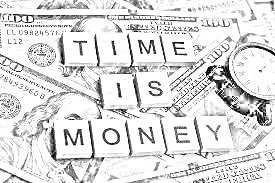
The Value of Time: Understanding the Adage “Time is Money”
- todayworldzone
- 0
- Posted on
In the hustle and bustle of modern life, one adage resonates more profoundly than most: “Time is money.” This succinct phrase encapsulates a fundamental truth about the human experience—a recognition that time, like currency, is a precious resource that must be managed wisely. From the boardrooms of multinational corporations to the humble homes of everyday individuals, the concept of time as a valuable commodity shapes our decisions, actions, and priorities.
At its core, the idea that time is money underscores the intrinsic link between time and productivity. In economic terms, every hour spent represents a potential opportunity cost—the foregone benefits of choosing one activity over another. Whether it’s a business executive allocating resources, an entrepreneur launching a startup, or a worker punching a time clock, the value of time permeates every aspect of our lives.
In the realm of business and entrepreneurship, the maxim “time is money” serves as a guiding principle for success. In fiercely competitive markets, companies must operate with maximum efficiency to thrive. Time wasted equates to lost revenue, missed opportunities, and diminished profitability. From streamlining production processes to optimizing supply chains, businesses constantly seek ways to minimize time expenditure and maximize output.
Moreover, the digital age has heightened the significance of time management. In an era of instant communication and rapid technological advancement, the pace of life has accelerated exponentially. Individuals and organizations alike must adapt to this frenetic tempo or risk being left behind. The ability to leverage time effectively has become a distinguishing factor between success and stagnation in today’s fast-paced world.
Beyond the realm of economics, the adage “time is money” carries profound implications for personal development and fulfillment. Time, unlike material wealth, is a finite resource—one that cannot be replenished or bought. Each passing moment represents an opportunity to invest in oneself, pursue meaningful relationships, or engage in activities that bring joy and fulfillment. By squandering time frivolously, we squander the potential for growth, learning, and self-improvement.
In the context of personal finance, the analogy between time and money takes on added significance. Just as prudent investment decisions can yield long-term financial returns, strategic use of time can lead to significant personal dividends. Whether it’s acquiring new skills, pursuing educational opportunities, or nurturing hobbies and interests, time invested wisely can enrich our lives in ways that transcend material wealth.
However, the concept of time as money is not without its critics. Some argue that reducing time to a mere economic metric diminishes its intrinsic value as a dimension of human experience. They contend that an overly instrumental view of time detracts from its qualitative aspects—moments of leisure, reflection, and connection that defy quantification. In their view, true wealth lies not in the accumulation of material possessions but in the richness of lived experience.
Moreover, the relentless pursuit of efficiency and productivity can exact a toll on individual well-being and societal cohesion. In the relentless quest to maximize output, people may sacrifice their health, relationships, and sense of fulfillment. The commodification of time can lead to a culture of overwork, burnout, and disconnection—a stark reminder that not all forms of wealth are created equal.
Nevertheless, the adage “time is money” endures as a potent reminder of the value of temporal resources in a world driven by productivity and performance. Whether embraced as a guiding principle for success or questioned as a reductionist view of human existence, the concept of time as a valuable commodity continues to shape our perceptions, decisions, and priorities.
In conclusion, the adage “time is money” encapsulates a profound truth about the human experience—a recognition that time, like currency, is a precious resource that must be managed wisely. From the boardrooms of multinational corporations to the humble homes of everyday individuals, the value of time permeates every aspect of our lives. Whether viewed as a guiding principle for success or questioned as a reductionist view of human existence, the concept of time as a valuable commodity continues to shape our perceptions, decisions, and priorities in profound ways.